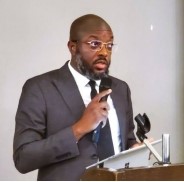Auditor General Office Hits Back At Detractors
-Demystifies ŌĆśMisleadingŌĆÖ Report Against AG Jackson
|
Getting your Trinity Audio player ready...
|
MONROVIA-OCTOBER 24, 2025: The Office of the Auditor General of Liberia has sharply reacted to allegation that Auditor General P. Garswa Jackson Sr. ŌĆ£willfully accepted to risk his careerŌĆØ by altering audit conclusions to eliminate $778 million in domestic debt.
In a strong worded statement, the Office of the Auditor General said the information is not only speculative but misleading and fundamentally flawed.
Addressing the key misconceptions, the AG Office noted, ŌĆ£The assertion that previously validated debts were erased lacks factual grounding. The audit did not ŌĆ£resubmit and denyŌĆØ old claims-it reviewed newly submitted documentation from debt holders. Claims that were not resubmitted were not reviewed. This aligns with standard audit protocol: no audit can validate what has not been presented.ŌĆØ
The Office furthered clarified that under the GAC Act of 2014, the Auditor General is empowered to define audit scope and methodology, conduct follow-up audits, and extend or revise audit parameters as necessary. The statement noted, ŌĆ£These actions are standard in professional auditing.ŌĆØ
ŌĆ£Suggesting that scope adjustments are unethical reflects a fundamental misunderstanding of audit procedures. Many claims from prior periods had already been settled. The audit team cross-referenced payment records and excluded obligations that had been fulfilled. This is reconciliation-not erasure. The audit filtered out duplicates, settled claims, and unsupported entries to ensure accuracy and transparency,ŌĆØ the Office further clarified.
ŌĆ£According to the Global Internal Audit Standards (2024) issued by The Institute of Internal Auditors (IIA), internal audit activities must follow a systematic and disciplined approach with clearly defined objectives and scope, appropriate methodologies, and thorough documentation of procedures and evidence. Labeling this process as ŌĆ£double dippingŌĆØ is a mischaracterization. The audit did not revalidate old claims-it validated current, properly submitted ones. Follow-up audits are a professional obligation not a discretionary choice.ŌĆØ
The statement pointed out that as outlined in ISA 230 (Audit Documentation) and ISA 505 (External Confirmations), follow-up procedures are essential for verifying corrective actions, confirming outstanding balances, and investigating unresolved issues. ŌĆ£These procedures support the GACŌĆÖs decision to exclude previously settled claims and ensure the audit reflects current obligations-not outdated or resolved ones.ŌĆØ
The AG Office noted that the GAC Act of 2014 authorizes the Auditor General to revise audit scope as needed adding, ŌĆ£This is consistent with international standards, which recognize that scope adjustments may be necessary due to new information, evolving risks, and stakeholder needs. Changing scope is not manipulation-it is a safeguard that ensures audits remain relevant, responsive, and comprehensive.ŌĆØ
The statement added that the IMF benchmark is a policy objective-not a directive to manipulate audit outcomes. The GAC operates independently. While the auditŌĆÖs timing may coincide with fiscal targets, correlation does not imply causation. There is no credible evidence of political interference in the auditŌĆÖs conclusions.
Concluding, the Office noted that the Auditor GeneralŌĆÖs actions were lawful, methodical, and aligned with professional standards adding that the accusations are built on conjecture not evidence. LiberiaŌĆÖs fiscal integrity must be defended with facts not folklore.
┬Ā


Comments are closed.